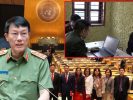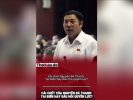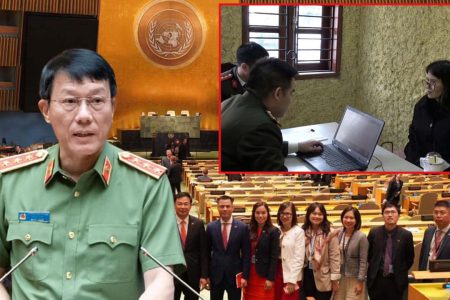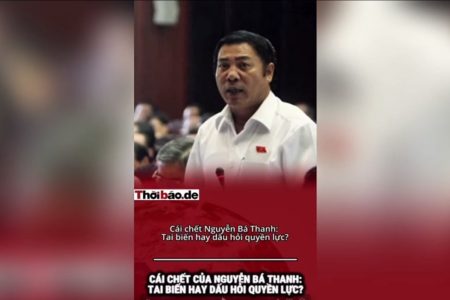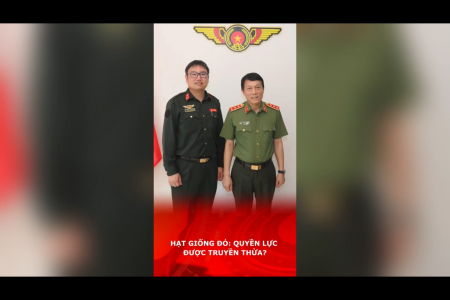
Many politicians around the world have repeatedly called on the Vietnamese government to respect human rights and stop all arrests and persecution of dissidents.
The letter from the eight US congressmen to Secretary of State Mike Pompeo and Secretary of the Treasury Steven Mnuchin, from Congressman Alan Lowenthal’s office on December 18 last year marked the first time Congressmen had made a move sanctions against Vietnamese officials allegedly violating human rights. That measure is to apply Magnitsly Act to 7 named officers of Ha Tinh province’s Police.
The police officers being accused of beating and torturing young political prisoners Nguyen Van Hoa include Colonel Nguyen Anh Tuan, Captain Nguyen Van Sang, Lieutenant Le Anh Duc, Captain Tran Anh Duc, Colonel Nguyen Huy Chuong, Major Colonel Truong Quang Quoc, Lieutenant Bui Xuan Dat, and Captain Nguyen Dinh Duc.
The purpose of the torture was to force Nguyen Van Hoa to confess guilt after his arrest. This young man was arrested just for filming and transmitting pictures of anti-Formosa protests, the company released toxic chemicals directly into the central coastal areas of Vietnam in April 2016.
US Congressmen signed a letter to Secretaries Pompeo and Mnuchin expressing their wish for targeted sanctions to have an impact. At a time when the Vietnamese government is seeking to expand its access to the US market and US products, it must be determined to strongly protect human rights and the rule of law.
Will the US State Department meet the congressmen’s request? The State Department spokesperson replied to Radio Free Asia by email:
„We do not publicize in advance the possibility of punishment“
On the side of the Vietnamese government, Radio Asia also called the Ministry of Public Security to ask about the incident, but the person who answered the phone hung up, then stopped answering the line.
Mr. Son Tran, a human rights activist and democracy activist from London, UK, shared with Radio Free Asia about Nguyen Van Hoa’s case as follows:
“In the case of Nguyen Van Hoa, I learned that the tortures were denounced by Nguyen Van Hoa‘ and the letters that his family brought out to denounce when visiting. For example, they hung him upside down on the ceiling for them to beat him. I hold real facts like that. In this case, there was a lot of evidence of torture that the American government received materials from the Magnitsky working group so they knew and they chose Nguyen Van Hoa for specific events.”
The Global Magnitsky Act regulates sanctions against individuals and officials whom the US considers violating human rights around the world. Most recently, on December 11 last year, the US-listed Wan Kuok-koi, a member of the Chinese Communist Party and a 14K gang boss on the punitive list.
The Global Magnitsky Act was never applied to Vietnamese government officials, but Son argued that its deterrence would force human rights abusers to consider their actions more closely.
“Global Magnitsky Act has two penalties for those who torture prisoners, whether prisoners of conscience or criminal ones. The first is that they will freeze the assets, if any, of those people in the US and in democratic countries. They prohibit such people from entering the US even for public business and they do not allow their children or relatives to come to the US, whether for study abroad or whatever. Second, the property of those people that have been illegally acquired is also frozen.
This deterrent, in my opinion, is very effective because most of the wealthy officials in Vietnam want to bring their children to study in the US, want their children to buy properties and houses in the US for them to stay after retirement.”
Former prisoner of conscience, journalist Nguyen Vu Binh said differently about Global Magnitsky law:
“With the mechanism and system of the Vietnamese communist government, which is a totalitarian mechanism, the responsibility for such actions as torturing, imprisoning, and imprisoning the fighters is a collective mechanism. It is very difficult to say that it has a great effect on stopping or stopping them. It can be limited, maybe there is, but to have a good effect, not much.”
Ms. Nguyen Xoan, daughter-in-law of prisoner of conscience Le Dinh Luong, through the chat application, outlined the limitations of the law:
“Currently, most of the Vietnamese officials have children and relatives who study and live abroad a lot, so I think the Global Magnitsky Act is one of their weaknesses.
Everyone knows that in Vietnam, the officers who torture prisoners of conscience and their relatives and dissidents mentally and physically are not strange. But there is a restriction when applying to punish violators in Vietnam is: all places where police officers work are prohibited from taking pictures, so it is difficult to record audio or to record videos as evidence.”
As for Mrs. Nguyen Thi Chuong, wife of a prisoner of conscience poet Nguyen Duc Thach, who has just been sentenced to 12 years in prison by the People’s Court of Nghe An province and 3 years under house arrest, she thinks that all pressure on the government of the Communist Party is good:
“As a monopolistic party, for prisoners and fighters outside, too, all pressures from all sides from economic to spiritual are under pressure. Living in rural areas, I don’t understand much, but if the countries can intervene, it’s fine.”
It is known that approximately 40 countries have enacted similar laws, so the Vietnamese community abroad has tried to mobilize efforts in countries such as Canada, the UK, France, etc.
One such organization that is making a similar effort is BPSOS. The organization annually files human rights violations in Vietnam to governments that are enforcing Magnitsky law.
In a newsletter dated December 2, BPSOS stated:
“The files submitted for being implemented by Global Magnitsky Act are useful as denouncing Vietnam’s government regarding human rights issues, regardless of how foreign government with the cases.”
Mr. Son Tran said that Magnitsky law is an opportunity for both activists and low-minded people to participate, collect information, and specific data to transfer to organizations like Mr. Son Tran’s group. He believes that in the future, there will be more civil society organizations in the country cooperating with the outside to continue reporting on officials who violate human rights or acquire illegal property.
Thoibao.de (Translated)


















